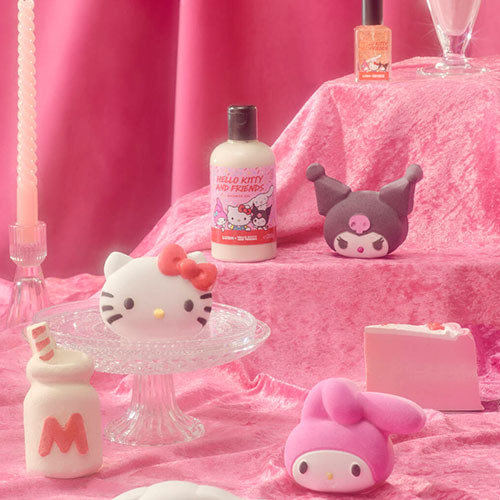Start Licensing’s Ian Downes pays a visit to Oxford and finds plenty of licensing highlights in the Westgate Centre.
I was in Oxford recently visiting The Ashmolean and during a break took the opportunity to visit the Westgate Centre, a large scale shopping mall with a broad range of blue chip retail tenants. There are over 100 shops in the centre.
The first thing that struck me about the shops in the centre was that they all seemed to be in sales mode, with large format posters in shop windows promoting these sales with discounts of around 50%. Interestingly this tactic was being deployed by all kinds of retailers including brands that aren’t always associated with high discount sales. I guess the signs are a sign of the times. Encouragingly the Westgate seemed busy in footfall terms and there were plenty of shoppers struggling with heavily laden bags, full of January bargains.
One other observation was that Westgate seemed to enjoy nearly full occupancy – I saw one empty store but this was badged with a ‘Coming Soon’ sign suggesting a big tenant would be moving in soon.
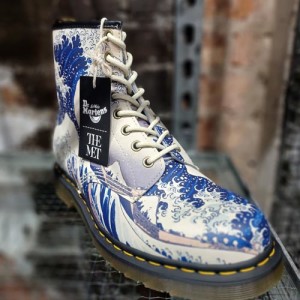 I visited a few of the shops in the Westgate looking out for licensing. One range that I was really pleased to see was in Dr Martens. It was selling a footwear range featuring designs from The Met – the Metropolitan Museum of Art based in New York. Dr Martens has really used The Met’s design and brand assets really well to create a range that works really well.
I visited a few of the shops in the Westgate looking out for licensing. One range that I was really pleased to see was in Dr Martens. It was selling a footwear range featuring designs from The Met – the Metropolitan Museum of Art based in New York. Dr Martens has really used The Met’s design and brand assets really well to create a range that works really well.
I am sure The Met collection has helped Dr Martens reach new consumers, but also initially helped it re-connect with lapsed consumers. It works well in-store, but has also generated interest in the media including social media. These kind of collaborations build a platform for marketing while also help refresh the core brand. The deal with The Met is also good news for the wider heritage licensing sector – I am sure other brands are looking at this and thinking about how they could engage with the heritage sector.
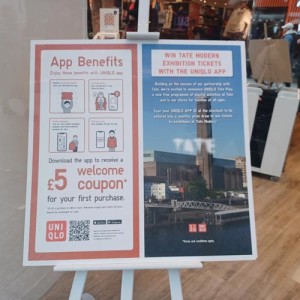 One retailer that has a long history of working with the heritage sector is Uniqlo. The Westgate branch is a large format one with lots of space set out on two floors. At the front of store it was promoting a link with the Tate Modern. Uniqlo’s promotion was centred on consumers winning tickets for Tate Modern Exhibitions. Within the shop it has a dedicated area which features a Museums of the World Collection. Currently it is featuring designs from the Louvre, Tate Modern and The Museum of Modern Art.
One retailer that has a long history of working with the heritage sector is Uniqlo. The Westgate branch is a large format one with lots of space set out on two floors. At the front of store it was promoting a link with the Tate Modern. Uniqlo’s promotion was centred on consumers winning tickets for Tate Modern Exhibitions. Within the shop it has a dedicated area which features a Museums of the World Collection. Currently it is featuring designs from the Louvre, Tate Modern and The Museum of Modern Art.
This is a strong commitment to this category of licensing and a reminder of the richness of the source material available from the heritage sector. That said companies like Uniqlo have moved on design in the heritage category using assets in a fashion lead way – arguably the heritage brand owners have become more relaxed about how their assets are used and how design works in the category.
Uniqlo also supports the artist community with t-shirt designs sourced from individual artists and promoted as a partnership, while it also continues to sell products based on the art of Keith Haring. The latter is a great example of a long-term art driven programme. Uniqlo also continues to support manga and anime properties as well.
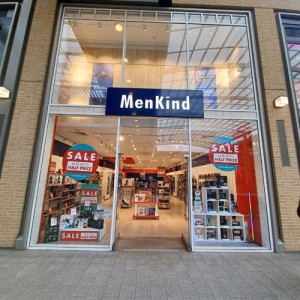 I also popped into Menkind, which is a heavy user of licensing across categories like games, lighting, gifting and accessories. One product category that particularly caught my eye was their food gifting products. These products were, I presume, part of Menkind’s Christmas offering. Featured brands included Pot Noodle, Slush Puppie, Marmite and Only Fools & Horses. This category works well for brand owners and for food brands like Marmite is a way of engaging with their consumers, gets them into new retail channels plus it helps reinforce their brand personality.
I also popped into Menkind, which is a heavy user of licensing across categories like games, lighting, gifting and accessories. One product category that particularly caught my eye was their food gifting products. These products were, I presume, part of Menkind’s Christmas offering. Featured brands included Pot Noodle, Slush Puppie, Marmite and Only Fools & Horses. This category works well for brand owners and for food brands like Marmite is a way of engaging with their consumers, gets them into new retail channels plus it helps reinforce their brand personality.
Other brands in Menkind in this category included a Hairy Bikers’ Pie Maker set and a range of Guinness flavoured mustards and marmalade. In this case, Guinness is using licensing as a way of celebrating the distinctiveness of the brand’s flavour and taste. Menkind was also featuring products based on gaming properties such as Minecraft and also more specialised products such as Remote Control vehicles featuring brands such as Lamborghini.
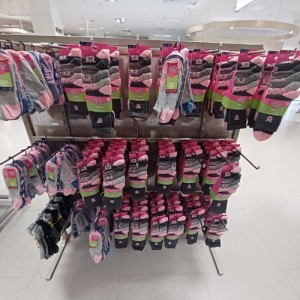 Near to the Westgate is a large branch of Marks & Spencer. M&S has traditionally been a big supporter of licensing, but my visit suggests that it isn’t running so many licensed lines at the moment. This may well be a cyclical thing. Although I did notice that it is using its own character brand Percy Pig across more categories. This character started out in the confectionery category but is now in categories such as apparel, toiletries, partyware and greeting cards. It may be that M&S’ use of Percy means it feels it can ease back a bit from licensing, particularly in terms of character licensing.
Near to the Westgate is a large branch of Marks & Spencer. M&S has traditionally been a big supporter of licensing, but my visit suggests that it isn’t running so many licensed lines at the moment. This may well be a cyclical thing. Although I did notice that it is using its own character brand Percy Pig across more categories. This character started out in the confectionery category but is now in categories such as apparel, toiletries, partyware and greeting cards. It may be that M&S’ use of Percy means it feels it can ease back a bit from licensing, particularly in terms of character licensing.
M&S was in sales mode and large parts of the shop were turned over to sales activities – there were some licensed lines in the sales stock which is not a great surprise as the retailer is looking to clear through stock across the board. M&S announced some encouraging results today which suggests it had a good Christmas trading period. One thing I noted in M&S was that the Oxford branch has a M&S Opticians within the store. It is interesting to see retailers using their shopfloor space in different ways. M&S has had in-store cafes for a long time. The M&S opticians featured a number of brand ranges including Superdry, Joules, Ray-Ban and Mulberry. It will be interesting to see if other retailers choose to diversify their retail offer further this year – this could present opportunities for licensing.
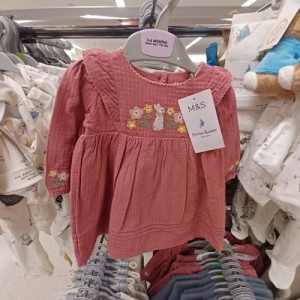 M&S featured licensed products in other parts of the store including bedding with Peanuts, Harry Potter, Smileyworld and Batman products on sale. One of the biggest licensed ranges in store is Peter Rabbit in the baby and toddler category. This range includes tops, dresses and jackets. It is a very stylish range with subtle design details and uses this classic licence well.
M&S featured licensed products in other parts of the store including bedding with Peanuts, Harry Potter, Smileyworld and Batman products on sale. One of the biggest licensed ranges in store is Peter Rabbit in the baby and toddler category. This range includes tops, dresses and jackets. It is a very stylish range with subtle design details and uses this classic licence well.
It seems to me to be a range that has been developed with a long-term partnership in mind and a commitment to bespoke design coupled with hi-spec products. I imagine this partnership has worked well for M&S and it may well encourage them to look at other long-term licensing partnerships particularly with classic brands that are ones that you can plan ahead with.
 Finally, I was interested to see an initiative from charity Age UK. It is working with The Wombles at the moment to encourage consumers to donate their unwanted Christmas gifts to their local Age UK shop. For Age UK it is a way of accessing good quality stock for its shops and, of course, avoids waste. The Wombles are a great fit for a campaign of this kind and it is good to see a character brand being used in this way.
Finally, I was interested to see an initiative from charity Age UK. It is working with The Wombles at the moment to encourage consumers to donate their unwanted Christmas gifts to their local Age UK shop. For Age UK it is a way of accessing good quality stock for its shops and, of course, avoids waste. The Wombles are a great fit for a campaign of this kind and it is good to see a character brand being used in this way.
Will be interesting to see what sort of product that gets donated to Age UK – hopefully not too many licensed products because as we all know everyone wants a licensed product for Christmas! But full marks to The Wombles for lending a hand to such a worthwhile campaign and cause.
Ian Downes runs Start Licensing, an independent brand licensing agency. His Twitter handle is @startlicensing – he would welcome your suggestions for what to look out for.



























